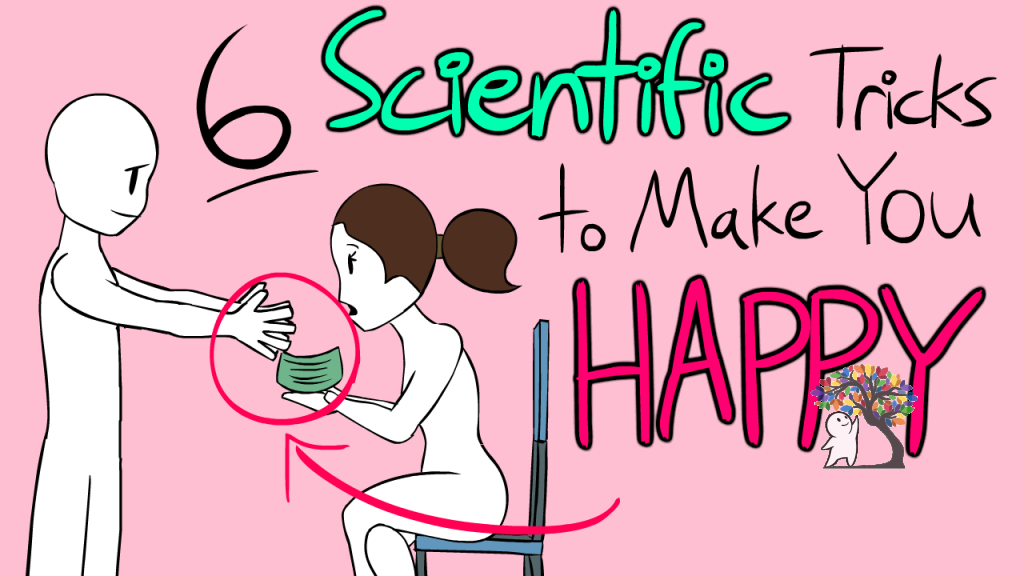6 Scientific Tricks to Make You Happier

What’s the most important thing in life? Contrary to popular opinion, it’s not money, fame, or even power. It’s happiness. This is all you really need to enjoy a high quality of life – plain and simple. There are plenty of people around the world who live in third world countries, with nothing more than the shirt on their back. And yet, often these are the happiest people on Earth. This perfectly illustrates how you don’t need much to be happy. So what’s their secret? How can YOU boost your happiness to sky-high levels? Funnily enough, there are plenty of tips and tricks which have been PROVEN to work wonders…
Number One: Spend Money On Others
When many of us are sad, we often go out and buy things in an effort to cheer ourselves up. This could be as simple as a chocolate bar or as extravagant as a new sports car. But stunning new research has shown that if you really want to use money to increase your happiness, you need to spend it on OTHER people. A study from 2008 gave people envelopes full of money. Half were instructed to spend it on themselves, while the other half were instructed to donate the money to charity, or buy a gift for a friend. Those that spent money on others reported much higher levels of happiness…
Number Two: Listen To Sad Songs
When we’re feeling blue, many of us put in our headphones, zone out, and play our favorite music. But before you choose the happiest songs on your playlist, you might want to listen to this. A 2014 study found that those listening to SAD music actually received “beneficial emotional effects.” These effects included “regulation of negative emotion and mood.” In simpler terms, sad music helps you handle your bad moods. So if you really want to cheer yourself up, put on the saddest song you can find in your playlist!
Number Three: Drink Coffee
We’re guessing no one was expecting this one. There’s been a lot of talk about how coffee might be good or bad for you, but not many people are discussing its effect on mood. There have actually been a few studies which have looked into this, and the results are pretty stunning. One of the most interesting studies was published in 2016, and it found that one cup of coffee per day equated to an 8% decrease in risk for depression – up to a limit of 509 mg of caffeine per day. Why is coffee so good at fighting off depression? Researchers aren’t 100% sure, but they think it might have to something with the antioxidants and anti-inflammatories present in coffee, as well as its link to dopamine production.
Number Four: Meditation
Of all the things we’re listing here, meditation probably has the most conclusive science to back it up. Meditation has been practiced for thousands of years, long before the science of psychology even existed. People have been aware of its benefits for a very long time, and its ability to reduce stress is well-known. And yes, numerous scientific studies have been able to back this up, proving that there’s a link between meditation and reduced stress and anxiety. Examples include studies of people in high stress situations, such as nursing students or people who were dealing with the aftermath of hurricane Katrina. Meditation worked wonders in almost all situations.
Number Five: Go For A Walk
Sometimes, the simplest methods are often the most effective. It seems like this is definitely the case when dealing with sadness, as research has shown that merely going for a walk can be a major gamechanger. There have been numerous studies on this subject. Some studies studied the positive effects of simply getting outside and experiencing nature – a walk in the forest, for example. Others found that walking in any situation increased happiness – simply because it involved exercise. But wherever you choose to stroll, going for a walk seems to be a really good idea to cheer yourself up.
Number Six: Get Your Feelings Off Your Chest
Keeping your emotions bottled up inside of you is never a good idea, and it definitely helps to get things off your chest. Have you ever felt that massive feeling of relief when you confess your fears and worries? It really does work wonders, and science seems to confirm this. One recent study looked at how recording a negative emotional experience can actually help calm our nerves, and help us deal with our worries. Those who were writing about their emotional experiences were much more calm and relaxed than those who were writing about other subjects.
As you can see, the cold and calculating laboratories of science can actually teach us a lot about how to warm up our hearts and cheer ourselves up. Who knows… Maybe you’ll find yourself using one of these methods one day.
If you enjoyed this video, please like and subscribe to see more content from Psych2Go. Thank you for watching! Now go do something fun!
Dunn, Elizabeth W., Lara B. Aknin, and Michael I. Norton. “Spending Money on Others Promotes Happiness.” Science. March 21, 2008. Accessed September 13, 2018. http://science.sciencemag.org/content/319/5870/1687.
Schroder, Hans S., Tim P. Moran, and Jason S. Moser. “The Effect of Expressive Writing on the Error-related Negativity among Individuals with Chronic Worry.” Psychophysiology55, no. 2 (2017). doi:10.1111/psyp.12990.
Taruffi, Liila, and Stefan Koelsch. “The Paradox of Music-Evoked Sadness: An Online Survey.” PLOS ONE. Accessed September 13, 2018. https://journals.plos.org/plosone/article?id=10.1371/journal.pone.0110490.
“The Effectiveness of a Stress Coping Program Based on Mindfulness Meditation on the Stress, Anxiety, and Depression Experienced by Nursing Students in Korea.” NeuroImage. January 13, 2009. Accessed September 13, 2018. https://www.sciencedirect.com/science/article/pii/S0260691708001792.
“Walking for Depression or Depressive Symptoms: A Systematic Review and Meta-analysis.” NeuroImage. April 04, 2012. Accessed September 13, 2018. https://www.sciencedirect.com/science/article/abs/pii/S1755296612000099.
Wang, L., X. Shen, Y. Wu, and D. Zhang. “Coffee and Caffeine Consumption and Depression: A Meta-analysis of Observational Studies.” Current Neurology and Neuroscience Reports. March 2016. Accessed September 13, 2018. https://www.ncbi.nlm.nih.gov/pubmed/26339067.



Responses